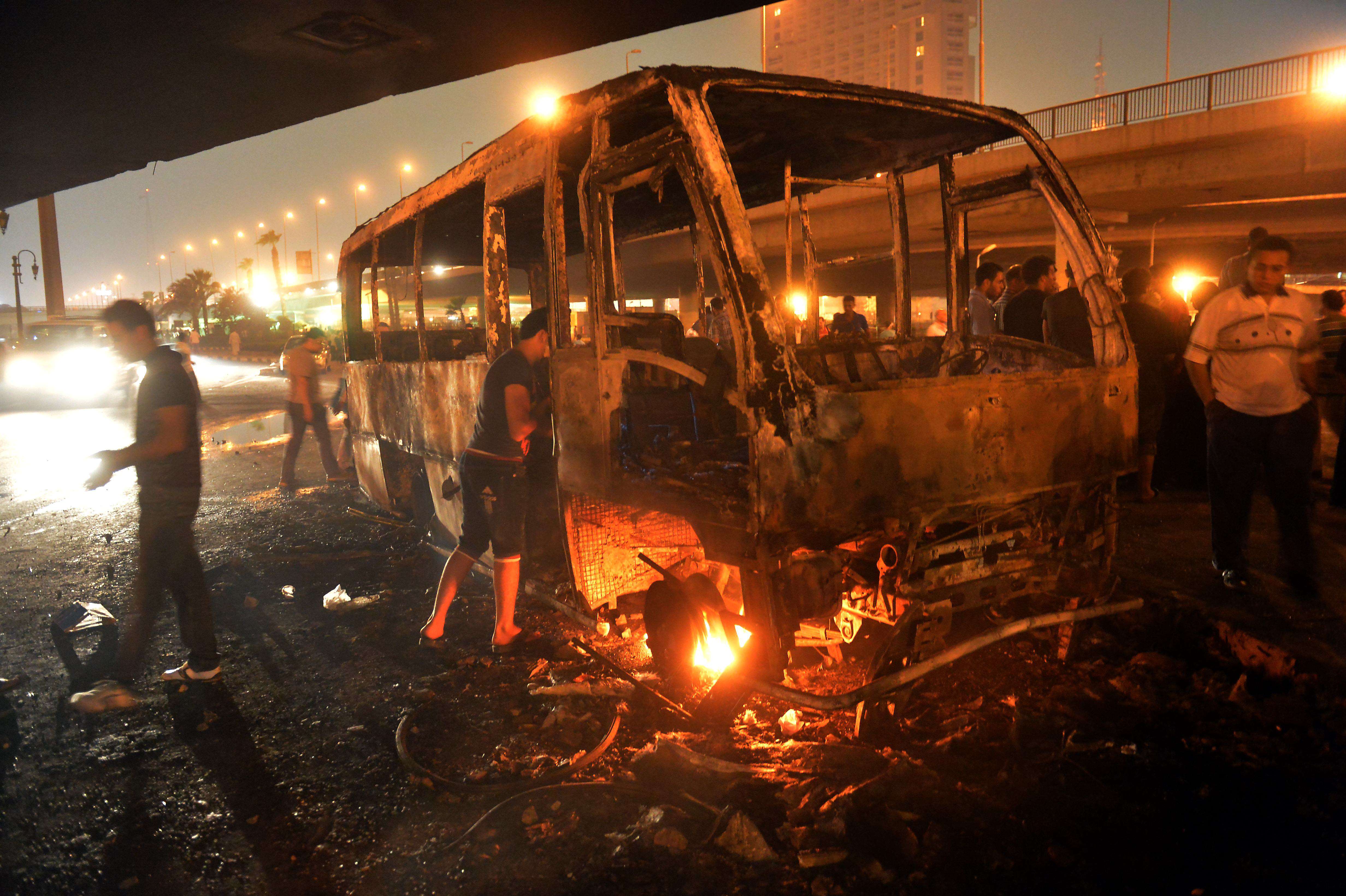By Ahmed Hazem
CAIRO: Thousands of protesters affiliated with Islamist groups gathered Friday in Tahrir Square, demanding that figures of the former regime be banned from practicing their political rights and be disqualified as presidential candidates.
In Alexandria, thousands of protesters affiliated with Islamist groups or parties also demonstrated.
In answer to a call for protest by the Muslim Brotherhood, its political arm the Freedom and Justice Party, the Salafi Al-Nour Party, as well as the Hazem Salah Abu Ismail presidential campaign, Egyptians turned out for prayers and protests in both cities.
In Tahrir, the numbers swelled by the afternoon as demonstrators chanted against military rule on a day dubbed “Friday of Protecting the Revolution.”
Their main grievance is the 11th-hour presidential candidacy of former intelligence chief Omar Suleiman, who was also Hosni Mubarak’s last minute choice for vice president before his ouster.
Ahmed Shafiq, appointed prime minister during the 18-day uprising, and former foreign affairs minister Amr Moussa — also former sec-gen of the Arab League — are among the presidential hopefuls who protesters wish to see scrapped before the final candidate’s list is announced on April 26.
Alexandria protesters marched after Friday prayers from Al-Qaed Ibrahim Mosque to the Northern Military base, denouncing the candidacy of figures from the former regime, which they said include Suleiman, Shafiq and Moussa.
They chanted against military rule and shouted, “No Shafiq, no Suleiman, this talk was in the past” and “Yes, we’re chanting against the army, down with army rule.”
To the same end, parliament approved late Thursday amendments to the law regulating political participation barring top Mubarak-era officials from running for president.
Lawmakers agreed to add a fourth clause to Article 3 of Law 73 of 1956, barring for 10 years anyone who held the position of president, vice president, prime minister, or head or secretary general of the National Democratic Party or member of its policies bureau or general committees over the 10 years preceding Feb. 11, 2011 from political participation.
Political participation is defined as voting and running in elections.
The amendments await ratification by the ruling Supreme Council of the Armed Forces, whose generals took over after Mubarak’s ouster and are tied to a July 1 handover of power to civilian rule.
Protesters chanted “Down with military rule” and “Field Marshal [Hussein Tantawi] is a traitor.”
Their resounding chants also accused Shafiq and Suleiman of being “American infiltrators.”
“Israel is safe under Suleiman’s rule,” protesters said, holding up banners with pictures of figures of the ousted regime.
Two main stages were set up in the heart of the iconic square, one by the Muslim Brotherhood and another by supporters of Abu Ismail under the slogan “Abu Ismail, the honest president.”
The ultraconservative Islamist candidate won a verdict obliging the interior ministry to provide documents proving his mother does not hold the US citizenship, something that if proven could eliminate him from the presidential race.
His supporters in Tahrir on Friday celebrated the court’s decision, saying his mother is not a US citizen and saying that the court’s decision clears the way for his presidential bid.
The court’s decision, however, only obliges the interior ministry to provide documents proving her nationality. Many Egyptians who acquire a second nationality fail to register with the government here and therefore are not recognized by Egypt as dual nationals.
The Presidential Election Commission will issue a final list of candidates on April 26.
“We came to Tahrir to vindicate Abu Ismail and stand united with all revolutionary movements against remnants of the old regime. We also support the Egyptian parliament’s [political participation amendment] and demand its enforcement,” Alaa Mostafa, media coordinator for Abu Ismail’s campaign, told Daily News Egypt.
“The military council’s support for Suleiman’s candidacy has made its conspiracy to bring back the old regime evident,” Mostafa added.
“If Suleiman runs for president, the results will be rigged to his advantage,” he claimed.
“Legally, Abu Ismail is now clear to run for presidency according to the court’s ruling and official documents. However, the media and his foes don’t want to accept this fact,” Khaled Nour Eldin, member of Abu Ismail’s defense team, said.
“We have ousted the head of the old corrupt regime, Mubarak, but his accomplices remain,” Ismail Soliman, coordinator of Al-Nour Party’s office in Hadayek El-Kobba, said.
Despite having two stages set up, there was a clear consensus between the demands of the MB and Salafi groups.
“There are currently attempts to unify the Brotherhood and Salafi front to support one presidential candidate,” said Mohamed Barbary, a leading youth in the Muslim Brotherhood.
Mohamed Gammal, 26-year-old marketing manager, said he joined the Alexandria protest to urge the military council to ratify amendments to a law that would bar figures of Mubarak’s regime from practicing their political rights.
“It’s irrational to have a revolution and then have presidential candidates that include [Egypt’s former] foreign minister, prime minister, and intelligence chief, from the regime we ousted,” he said.
Councilor Mahmoud El-Khodeiry spoke in front of the military court, calling on those present to join political powers in planned protests next Friday. –Additional reporting by Abdel Rahman Youssef

Thousands packed into Tahrir Square on Friday, in an Islamist show of strength against Hosni Mubarak’s old guard. (Daily News Egypt photo / Hassan Ibrahim)


